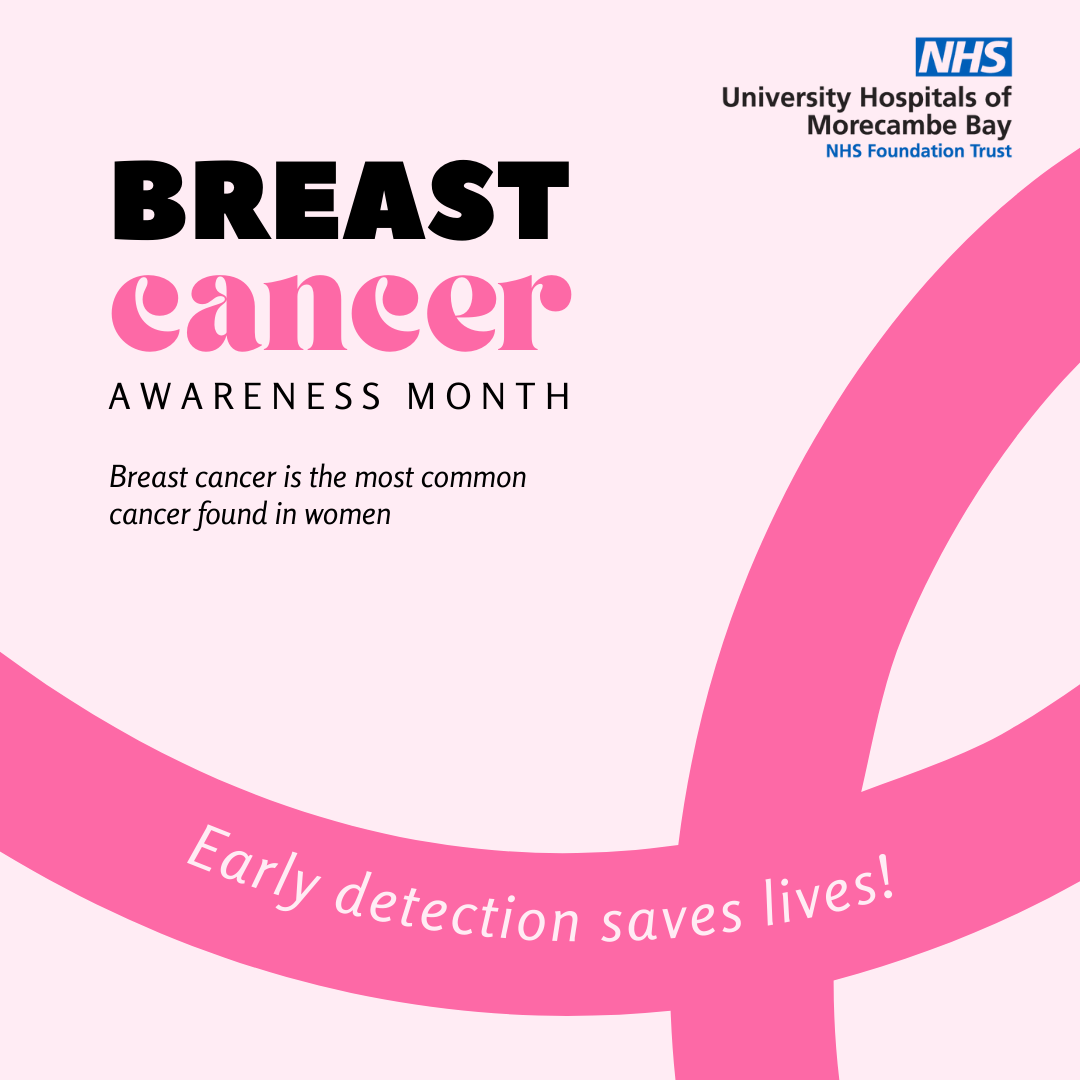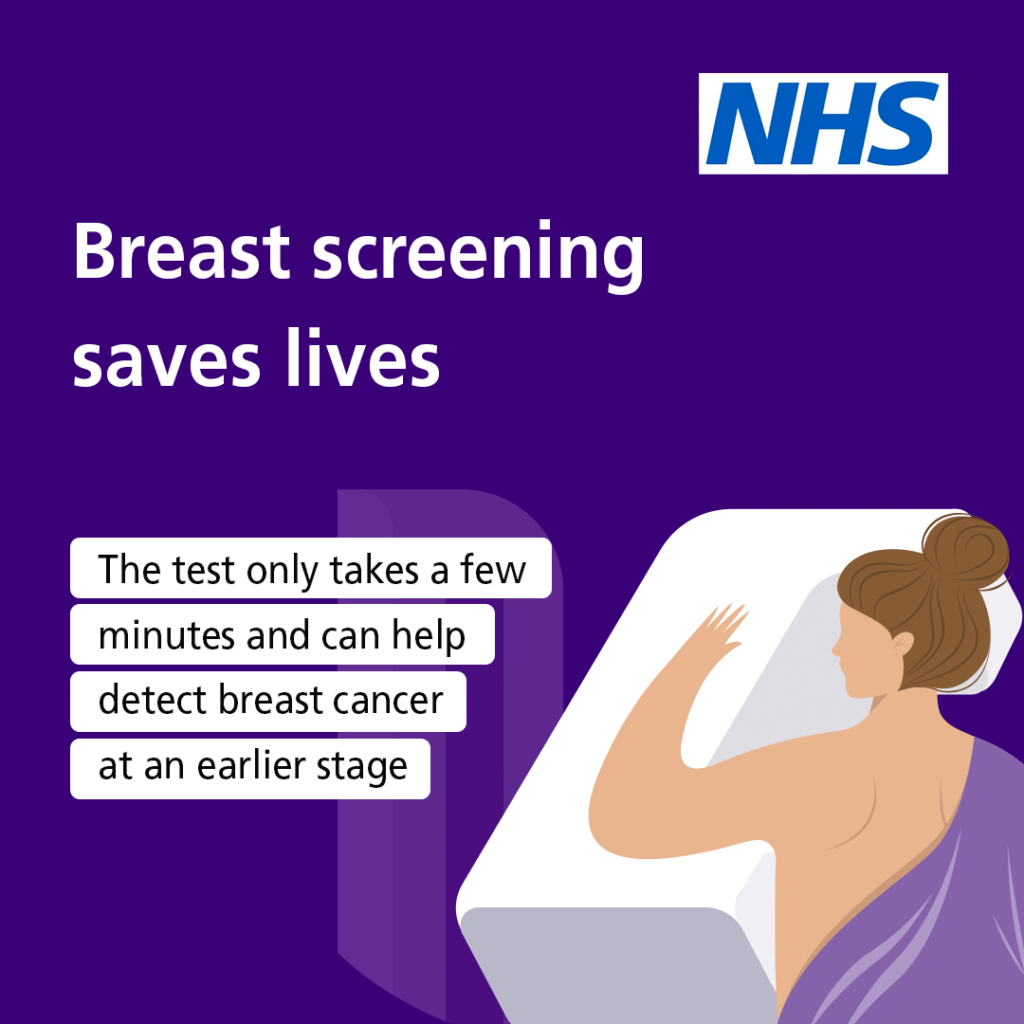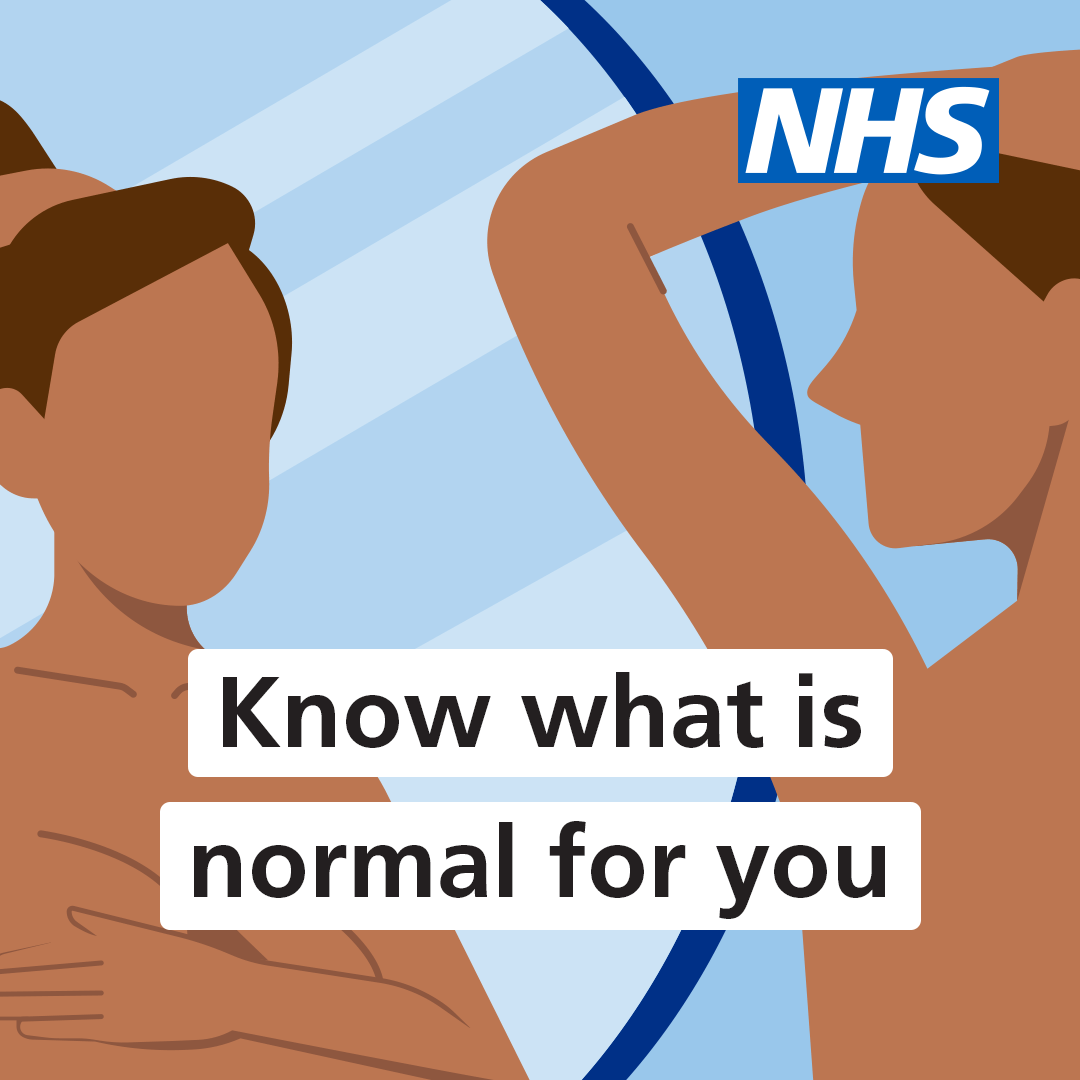 Breast Cancer Awareness month is taking place throughout October and the University Hospitals of Morecambe Bay NHS Foundation Trust (UHMBT) Research and Development Team is marking it by sharing details of the team’s involvement in pioneering research studies into breast cancer and how they can benefit patients.
Breast Cancer Awareness month is taking place throughout October and the University Hospitals of Morecambe Bay NHS Foundation Trust (UHMBT) Research and Development Team is marking it by sharing details of the team’s involvement in pioneering research studies into breast cancer and how they can benefit patients.
Around 55,000 people are diagnosed with breast cancer each year and is the most common type of cancer in the UK. Thankfully, there is a good chance of recovery from breast cancer, particularly if it is detected at an early stage.
UHMBT’s Research and Development Team is currently recruiting to 36 studies across the Royal Lancaster Infirmary (RLI), Westmorland General Hospital (WGH) in Kendal and Furness General Hospital (FGH) in Barrow. These are a mix of commercial drug studies as well as academic research and hundreds of patients are involved, sometimes for as long as 10 years or more. Seventeen of the active studies are related to cancer, including six breast cancer studies.
Hilary Thatcher, a Senior Research Nurse and Oncology Research Team Lead for UHMBT, and Laura Durrans, a Research Practitioner for UHMBT, both say there are many benefits for breast cancer patients who choose to be involved in research studies.
Hilary, who has worked in the department for the last 12 years, said: “Research can help to improve patient outcomes, and our focus is always to improve their quality of life.
 “Participation is always optional, but if a clinician feels that the patient is suitable and meets the eligibility, we will look to offer the patient the opportunity to take part, although they are free to opt out at any time. Every study follows a strict protocol which has been ethically approved. A lot of studies look at patients’ quality of life and we ask all sorts of questions throughout their treatment. This is important because of the length of time it takes to go through the treatment. Patients often decide to get involved in research for altruistic reasons – they want to do something to help others. They hope that by participating in research studies they will be helping patients in the future.”
“Participation is always optional, but if a clinician feels that the patient is suitable and meets the eligibility, we will look to offer the patient the opportunity to take part, although they are free to opt out at any time. Every study follows a strict protocol which has been ethically approved. A lot of studies look at patients’ quality of life and we ask all sorts of questions throughout their treatment. This is important because of the length of time it takes to go through the treatment. Patients often decide to get involved in research for altruistic reasons – they want to do something to help others. They hope that by participating in research studies they will be helping patients in the future.”
UHMBT’s Clinical Strategy – ‘Patient First’ – is centred on patients and aims to provide the best possible care and treatment for the people of Morecambe Bay. Research studies are an important part of the strategy in terms of ensuring that the Trust delivers outstanding care, treatment and experience, both now and in the future.
Laura, who has a master's degree in psychology and came into research via the National Institute for Health and Care Research (NIHR) Practitioner Pathway, said: “We get a lot of great feedback from our patients, and they like the extra level of care that we can provide.
“Research studies may involve extra tests and patients can find that reassuring. I have the luxury of spending extra time with patients because we want to know about every type of side effect. People tell us how they are feeling, and we build up close relationships.”
One of the research studies currently underway at UHMBT is an international study called OPTIMA. Usually, for patients with ‘ER-positive HER-2' negative breast cancer, chemotherapy and hormone (endocrine) therapy is given as treatment to reduce the chances of the cancer coming back, but some people might not benefit from having chemotherapy. It is possible that some patients will do just as well with hormone treatment alone. Chemotherapy can have unpleasant short-term and long-term side effects, so researchers have developed the Pro signa Test, which can be used to predict whether a person might benefit from chemotherapy. The Pro signa test is carried out on samples of tissue taken from the tumour removed at surgery and looks at 50 genes in the cancer cells to assess whether chemotherapy will be an effective treatment.
More research into how best to use this and other similar tests is needed to find out if patients don’t need chemotherapy but can still have their cancer treated effectively. Giving less treatment with the same or better results is called ‘de-escalation’ or ‘de-intensification’ and can optimise treatment to best suit each patient.
 Hilary said: “The decision not to have chemotherapy can be an active choice as there are risks in having that type of treatment. There are a lot of variables as to what treatment a person might be offered, and the OPTIMA study will help us to decide on the best treatments to use.”
Hilary said: “The decision not to have chemotherapy can be an active choice as there are risks in having that type of treatment. There are a lot of variables as to what treatment a person might be offered, and the OPTIMA study will help us to decide on the best treatments to use.”
Another research study that has been underway at UHMBT for over 10 years is called ‘FAST- Forward’. Patients who have been diagnosed with early breast cancer are usually prescribed radiotherapy after surgery as part of their curative treatment. Radiotherapy uses high-energy waves called x-rays to destroy any cancer cells that may be left in the breast after the operation. Research has shown that having radiotherapy after breast cancer surgery lowers the risk of the cancer coming back, however it may cause some short- and long-term side effects as well.
Previous clinical trials showed that the same, or even better results could be achieved with a lower total dose of radiotherapy given in fewer, larger daily doses. The FAST-Forward trial aims to test whether the number of daily doses could be reduced even further without reducing the beneficial effects of radiotherapy. The majority of patients in the UK who receive radiotherapy after breast surgery have 15 doses delivered over a three-week period. The FAST-Forward trial compares this three-week course with five doses delivered in five days over one week. This trial has huge implications for patients’ convenience and quality of life.
The team is also undertaking a research study with Astra Zeneca to trial a new type of chemotherapy for triple negative breast cancer.
Hilary said: “I love my job, and I love working with these wonderful patients. As the lead for the team, I don’t see patients as often as Laura, but everything I do is aimed for them by selecting and setting up suitable trials that will be of benefit. Ultimately, I do it because I want to help improve patient care.”
Laura added: “I also love working in research because I get to spend a lot of time with patients. Taking part in research can be a very positive experience for them because they get extra input into their care and often have better outcomes. There is an extra level of being looked after. Even if it doesn’t benefit them, it will benefit patients in the future. Patients often tell us that they want to make a difference for other patients.”
 Anyone who is interested in finding out more about participating in research can click on this link and register to Be Part of Research (nihr.ac.uk)
Anyone who is interested in finding out more about participating in research can click on this link and register to Be Part of Research (nihr.ac.uk)
UHMBT advises women to check regularly for any changes and to see their GP promptly if they are concerned. Men can also be diagnosed with breast cancer, but this is much less common. A video of how to check for any signs and symptoms of breast cancer is on this link.
The Trust also encourages people to attend their local screening appointments between the ages of 50 – 70 years.
Further information can be found on this link: Breast Cancer :: University Hospitals of Morecambe Bay NHS Foundation Trust (uhmb.nhs.uk)

